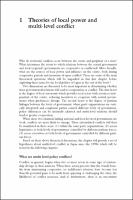Chapter 1 Theories of local power and multi-level conflict
Proposal review
Abstract
This book is about why and how central and local governments clash over important national policy decisions. Its empirical focus is on the local politics of Japan which has significantly shaped, and been shaped by, larger developments in national politics. The book argues that since the 1990s, changes in the national political arena, fiscal and administrative decentralization, as well as broader socio-economic developments have led to a decoupling of once closely integrated national and local party systems in Japan. Such decoupling has led to a breakdown of symbiotic relations between the centre and regions. In its place are increasing strains between national and local governments leading to greater intra-party conflict, inter-governmental conflicts, and more chief executives with agendas and resources increasingly autonomous of the national ruling party. Although being a book primarily focused on the Japanese case, the study seeks to contribute to a broader understanding of how local partisans shape national policy-making. The book theorizes and investigates how the degree of state centralization, vertical integration for party organizations, and partisan congruence in different levels of government affect inter-governmental relations. Japan’s experience is compared with Germany, Canada, and the UK to explore sources of multi-level policy conflict.
Keywords
multi-levelPublisher
Taylor & FrancisPublisher website
https://taylorandfrancis.com/Publication date and place
2017Imprint
RoutledgeSeries
Routledge Contemporary Japan Series,Classification
Regional, state and other local government
Political parties and party platforms
Public administration
Central / national / federal government policies


 Download
Download